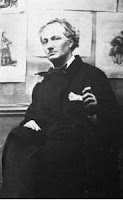
Why do I have so much trouble with Charles Baudelaire? I have read four of his books recently, which helped some, but I remain nervous. What were they? The Flowers of Evil (1857/1861), Paris Spleen (1868), a modest collection of his letters, and a more comprehensive collection of essays (Selected Writings on Art and Literature, Penguin Classics, 1972).
The puzzle, to me, is that, looked at poem by poem, Baudelaire is not so intimidating. His famous albatross poem, for example, is perfectly straightforward, an ordinary sonnet with (in French) regular rhymes:
Often, to amuse themselves, the men of the crew
Catch those great birds of the seas, the albatrosses,
Lazy companions of the voyage, who follow
The ship that slips through bitter gulfs.
***
The Poet is like the prince of the clouds,
Haunting the tempest and laughing at the archer;
Exiled on earth amongst the shouting people,
His giant's wings hinder him from walking.
I omitted additional, excellent, description of the albatross. The translation is by Geoffrey Wagner, and other translations are at the link. The albatross is a graceful bird in the air, but clumsy on land. The poet is like the albatross.
What's so hard about that? I know, I know. The anxiety is the result of the cumulative effect of Baudelaire, the series of poems about vampire lovers and sexualized wounds and opium and wine and beating up beggars and other bizarreries. Perhaps reading him in any bulk is exactly the wrong approach.

The Soup and the Clouds
My little crazy beloved was serving me dinner, and through the dining room's open window I was contemplating the moving architectures that God fashions from vapors, the marvelous constructions of the impalpable. And I was saying to myself, through my contemplation, "All those phantasmagorias are almost as beautiful as the eyes of my beautiful beloved, my little green-eyed monstrous madwoman."
And suddenly I received a violent punch in the back, and I heard a hoarse and charming voice, a hysterical voice and husky as if from brandy, the voice of my dear little beloved, which was saying, "Will you ever eat your soup, you goddamn cloud peddler!"
I love Baudlaire, but perhaps it is a bit much too immerse yourself in him.
ReplyDeleteWhat's your approach? For example, how seriously to you take him?
ReplyDeleteBaudelaire keeps slipping from my grasp.
When I first read him, I totally immersed myself in him, took everything he wrote quite seriously, and looking back I imagine myself lounging around drinking absinthe and only going out at night.
ReplyDeleteSo it makes you a little crazy. I don't know if that's the best approach, but I can dip into him now quite comfortably.
You've identified the problem - I have no particular interest in absinthe. Cidre bouché is my drink.
ReplyDeleteYou are very encouraging. Time, study, reflection, wine. That'll do it.